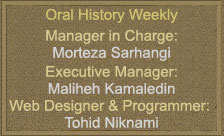| No. 422 | 24 December 2019 |
Opening Speech of the Conference Secretary in the 12th National Oral History Conference of Iran12th Conference on Oral History of Industry, Engineering and Holly Defense Support (18 December 2019, University of Isfahan):The oral history of the Holly Defense and the imposed war is a new and fascinating work in the field of historiography and recording the events of the Holly Defense. Considering that the Holly Defense is a public, mass, and universal subject it requires due recognition of all aspects, organizations, and institutions and various aspects of the war and the sciences of the Holly ...A brief overview of “Seventy Years of Sustainability”Forty Decades of Limpid MemoriesIf you are interested in history and looking for a good source for oral memoirs, Seventy Years of Sustainability can fulfill your wishes. In this book, Hossein Shah Hosseini recounts his memoirs from 1320 to 1360, from childhood to the beginning of political activities, joining the National Front, being imprisoned during political activities to the victory of the Islamic Revolution, and welcoming the Imam Khomeini Committee and accepting the presidency shortly afterwards of the Physical Education Organization and National Olympic Committee.The 308th Night of MemoryNavy Name Is Interwoven with Name of Martyr HemmatiAs reported by Iranian Oral History Website, the 308th session of memory night of Sacred Defense was held in Sooreh Hall of Hozeh Honari on Thursday evening, November 26, 2019. In this session, Abdollah Maanavi, Asghar Rezaee and Mir-Mansour Seyyed Qoreishi expressed their memories of the courage of Islamic Republic of Iran Navy (NEDAJA) during the Iraq imposed war on Iran.It was brought up at the workshop “Midday with Oral History”Preservation of “lost worlds” with oral historyIn the scientific-research workshop “Midday with Oral History”, Dr. Morteza Nouraee said, “There are spaces in old tradition and modern tradition of historiography with which have not dealt and they are called “lost world”. We as just historians must pay attention that we should also deal with the lost worlds in distribution of historiography.” According to the website of Oral History, the scientific-research workshop ...Neglected History (2)Critique of Internal Historiography of the United Islamic Students Association AbroadAn interview with Mojtaba BaghernejadIn the first part of the interview, Mr. Bagharnejad described the history of the United Islamic Students Association Abroad to understand the subject and the reasons for its importance in the historiography of the Islamic Revolution and its lack of resources. Oral History Weekly Magazine Aims and Regulations
Oral History Weekly Magazine wishes to create a suitable place for thoughts and idea development; Its main field would be “Oral History” and subjects as telling & writing memoirs, writing diaries, travelogues, chronologies, and all other subfields of history which are presented in the form of news, articles, reports, notes, interviews and memoirs can be included. There is no limitation on the length of would-be-sent materials. Mentioning the name, academic background and email is necessary. Articles with complete references and bibliography are more credited and an abstract would quite helpful. Weekly is not about to publish any material consisting insults and libels about other people or anything that brings anxiety to public opinion. Weekly can edit and translate the received materials. The published articles and materials are only the writer’s ideas and Oral History Weekly Magazine has no responsibility about their content. |
 Thirsty Sands (Part 21) Jafar Rabiei Design: Ali Vaziri First published in 1991 Publishing House, Islamic Propagation Organization Printed at the Aryan
Following these pressures exerted by Iraqi in order to impress the POWs mentally, they started broadcasting programs over the loudspeakers interminably for 16 to 18 hours a day. Most of the programs were vulgar music. The loudspeakers were turned on at 6 in the morning, and after a pause of one hour were again started at l or 2 p.m. At sunset they were turned off for half an hour, and then again turned on. Except for one night when a few of our friends had been taken from Oate three outside the camp for torture, the Iraqi guards did not come to the Oate on other night and it was only in Qate two that unexceptionally every night after sunset prayers the doors of the halls were opened to the halls and by calling some new names took them out of the camp and returned only after heavy beatings with bloody, half dead bodies. No one knew why this pressure was being exerted only on Qate two, while in Qate three there were people lining in the same spirit and characteristics.    |
